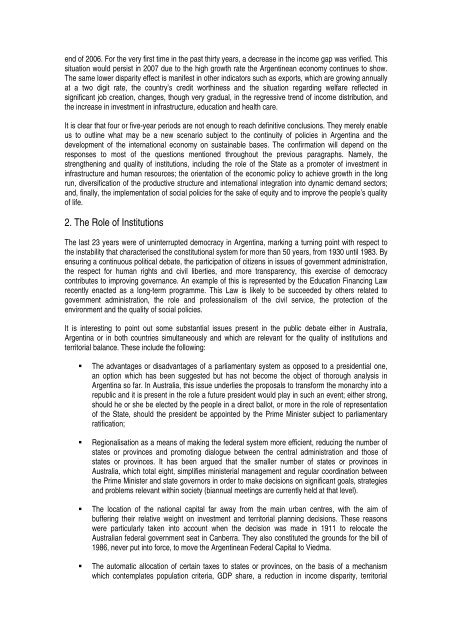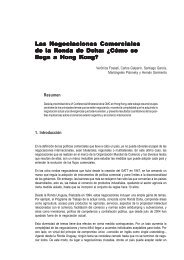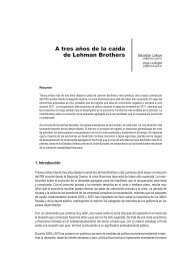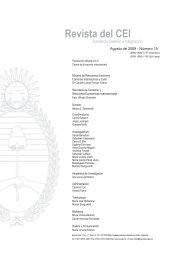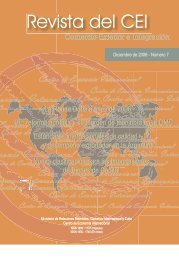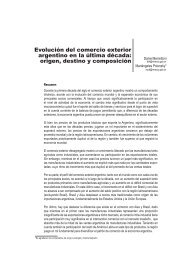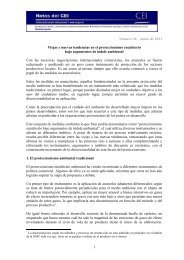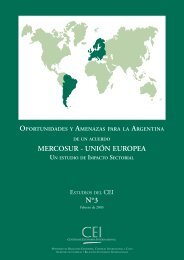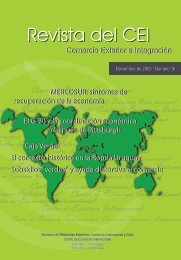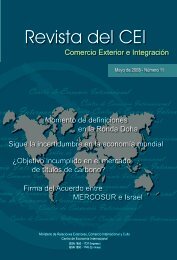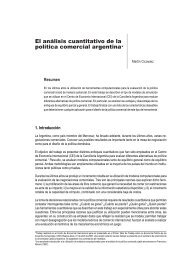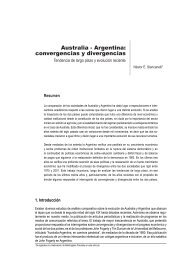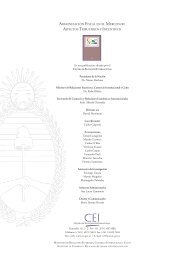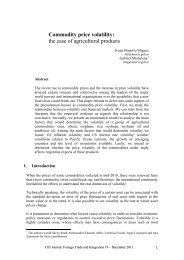end of 2006. For the very first time in the past thirty years, a <strong>de</strong>crease in the income gap was verified. Thissituation would persist in 2007 due to the high growth rate the Argentinean economy continues to show.The same lower disparity effect is manifest in other indicators such as exports, which are growing annuallyat a two digit rate, the country’s credit worthiness and the situation regarding welfare reflected insignificant job creation, changes, though very gradual, in the regressive trend of income distribution, andthe increase in investment in infrastructure, education and health care.It is clear that four or five-year periods are not enough to reach <strong>de</strong>finitive conclusions. They merely enableus to outline what may be a new scenario subject to the continuity of policies in Argentina and the<strong>de</strong>velopment of the international economy on sustainable bases. The confirmation will <strong>de</strong>pend on theresponses to most of the questions mentioned throughout the previous paragraphs. Namely, thestrengthening and quality of institutions, including the role of the State as a promoter of investment ininfrastructure and human resources; the orientation of the economic policy to achieve growth in the longrun, diversification of the productive structure and international integration into dynamic <strong>de</strong>mand sectors;and, finally, the implementation of social policies for the sake of equity and to improve the people’s qualityof life.2. The Role of InstitutionsThe last 23 years were of uninterrupted <strong>de</strong>mocracy in Argentina, marking a turning point with respect tothe instability that characterised the constitutional system for more than 50 years, from 1930 until 1983. Byensuring a continuous political <strong>de</strong>bate, the participation of citizens in issues of government administration,the respect for human rights and civil liberties, and more transparency, this exercise of <strong>de</strong>mocracycontributes to improving governance. An example of this is represented by the Education Financing Lawrecently enacted as a long-term programme. This Law is likely to be succee<strong>de</strong>d by others related togovernment administration, the role and professionalism of the civil service, the protection of theenvironment and the quality of social policies.It is interesting to point out some substantial issues present in the public <strong>de</strong>bate either in Australia,Argentina or in both countries simultaneously and which are relevant for the quality of institutions andterritorial balance. These inclu<strong>de</strong> the following:• The advantages or disadvantages of a parliamentary system as opposed to a presi<strong>de</strong>ntial one,an option which has been suggested but has not become the object of thorough analysis inArgentina so far. In Australia, this issue un<strong>de</strong>rlies the proposals to transform the monarchy into arepublic and it is present in the role a future presi<strong>de</strong>nt would play in such an event; either strong,should he or she be elected by the people in a direct ballot, or more in the role of representationof the State, should the presi<strong>de</strong>nt be appointed by the Prime Minister subject to parliamentaryratification;• Regionalisation as a means of making the fe<strong>de</strong>ral system more efficient, reducing the number ofstates or provinces and promoting dialogue between the central administration and those ofstates or provinces. It has been argued that the smaller number of states or provinces inAustralia, which total eight, simplifies ministerial management and regular coordination betweenthe Prime Minister and state governors in or<strong>de</strong>r to make <strong>de</strong>cisions on significant goals, strategiesand problems relevant within society (biannual meetings are currently held at that level).• The location of the national capital far away from the main urban centres, with the aim ofbuffering their relative weight on investment and territorial planning <strong>de</strong>cisions. These reasonswere particularly taken into account when the <strong>de</strong>cision was ma<strong>de</strong> in 1911 to relocate theAustralian fe<strong>de</strong>ral government seat in Canberra. They also constituted the grounds for the bill of1986, never put into force, to move the Argentinean Fe<strong>de</strong>ral Capital to Viedma.• The automatic allocation of certain taxes to states or provinces, on the basis of a mechanismwhich contemplates population criteria, GDP share, a reduction in income disparity, territorial
occupation and <strong>de</strong>centralisation of economic activity. In Australia, this measure was implementedin July 2000 by means of a tax reform creating the value ad<strong>de</strong>d tax to be collected by the fe<strong>de</strong>ralgovernment and allocated to states. In Argentina, the Constitution enacted in 1994 stipulates theadoption of a tax revenue sharing system between the fe<strong>de</strong>ral administration and the provinces,but said system has not been agreed upon yet; and• The role of the civil service, arising from a rigorous and unbiased recruiting system, as a stablestructure to counsel and manage the operation of the various State <strong>de</strong>partments and institutions.In Australia, positions up to that of Secretary are filled by professional civil servants, while onlythe Ministers and their cabinets comprise political posts, coordinating management with thepermanent administrative structure. In Argentina, a similar system is applied at the Ministry ofForeign Affairs, International Tra<strong>de</strong> and Worship, but this does not extend to the different areas ofgovernment. For this purpose, several initiatives to be carried out by the National Institute ofPublic Administration are still pending.3. The Macroeconomic FundamentalsThe investment coefficient, this is, investment in relation to GDP, is at 16% in Australia, slightly above thelevel required for capital replenishment. In Argentina, said coefficient, which had been slightly over 10%during the 2001-2002 crisis, rose to 19.8% in 2005, and has been higher than 20% during 2006.Nevertheless, that level is still not enough to ensure sustained economic growth in the long run, higherthan 5%, in or<strong>de</strong>r to reverse stagnation, mo<strong>de</strong>rnise physical infrastructure and solve the social aftermathof a long stagnation period and recurrent crises.Both in Australia and in Argentina, the behaviour of the autonomous balance of payments is crucial for thegeneration of savings. In the case of Argentina, the <strong>de</strong>crease in external funding and the effect of <strong>de</strong>btrepayment, with its negative impact on the capital account of the balance of payments, <strong>de</strong>termine the needfor a substantial increase in the domestic savings ratio and foreign direct investment in or<strong>de</strong>r to finance theinvestment rate increase on a sustainable basis. Companies’ profitability, government’s primary savings,and the behaviour of the financial sector as an intermediary to channel household savings to theproduction sector appear as necessary prerequisites to pursue this aim.In view of this, a relevant aspect regarding companies’ profitability and the generation of genuine savingsto be allocated to investment has to do with relative prices of tradable goods and services and theirrelation with the domestic currency real exchange rate. In Argentina, since 2002, when the peso was<strong>de</strong>valuated, there has been a gradual improvement of competitiveness reflected in the increase in exports,particularly of industrial goods. In Australia, the significant expansion of the energy and mineral resourcesector and the important capital inflow have given rise to a strong currency appreciation, which affectsagricultural and industrial exports and induces a current account <strong>de</strong>ficit of almost 6% of GDP. Thisevolution is connected with the role the exchange rate and capital flows play in an open economy. While inArgentina the fundamental question lies on the restructuring of <strong>de</strong>bt repayment and services in or<strong>de</strong>r toobtain resources for investment in infrastructure and production, in Australia, capital flows and exchangerate fluctuations appear as the major constraints for the achievement of mid-term equilibrium in the currentaccount and for the restoration of the goods and services sector competitiveness.The above-mentioned exchange rate policies of a practically free floating and freedom of capital flows inAustralia and of dirty float with controlled capital movements in Argentina can be observed in a divergentevolution of output and of the balance of payments current account over the past years. If this divergenceis to persist, it will have effects on the potential for growth and supply adjustment to the internationalmarket and, additionally, on the long and mid-term macroeconomic equilibrium. While in Argentina themaintenance of a <strong>de</strong>preciated exchange rate represents an objective for the monetary and interest ratepolicy, in Australia, the target is to keep annual inflation within a 2% to 3% range creating a positiverelationship between the interest and exchange rates, the former increasing and the latter appreciating.This promotes portfolio capital inflow, which at the same time contributes to maintain exchange rateappreciation.
- Page 1 and 2:
Revista del CEIComercio Exterior e
- Page 3:
SUMARIOCOYUNTURA COMERCIALEstructur
- Page 7 and 8:
PresentaciónLa sección de coyuntu
- Page 13 and 14:
G r á f i c o 3Diversificación de
- Page 15 and 16:
Las exportaciones de productos prim
- Page 17 and 18:
Relacionado con la evolución que v
- Page 19 and 20:
Vinculado al fuerte crecimiento que
- Page 21 and 22:
Este efecto fue revertido principal
- Page 23 and 24:
Aun así, merecen destacarse al men
- Page 25 and 26:
Cuadro A 1Evolución del saldo de b
- Page 28 and 29:
Cuadro A 4Exportaciones e índice d
- Page 30 and 31:
Cuadro A 6Saldo de balanza comercia
- Page 32 and 33:
las exportaciones en concepto de vi
- Page 34 and 35:
G r á f i c o 3Valor y cambio abso
- Page 36 and 37:
como lo son Egipto, Nigeria, Venezu
- Page 38 and 39:
G r á f i c o 2Crecimiento de las
- Page 40 and 41:
El total exportado también se encu
- Page 42 and 43:
Del Cuadro 1 se desprende una asoci
- Page 44 and 45:
En el primer semestre del año, el
- Page 46 and 47:
Vehículos de navegación aérea, m
- Page 48 and 49:
Unidos. En todos los casos menciona
- Page 50 and 51:
BibliografíaCastagnino, T. (2006).
- Page 52 and 53:
Cuadro A 2G R Á F I C O 1:Exportac
- Page 54 and 55:
Cuadro A 4Exportaciones e índice d
- Page 56 and 57:
Cuadro A 6Saldo de balanza comercia
- Page 58 and 59:
las exportaciones en concepto de vi
- Page 60 and 61:
G r á f i c o 3Valor y cambio abso
- Page 62 and 63:
Se mantiene eldinamismo del BloqueH
- Page 64 and 65:
vez como miembro pleno, en junio tu
- Page 66 and 67:
en el primer semestre del año.Las
- Page 68 and 69:
septiembre del año pasado un baja
- Page 70 and 71:
considera que al cierre del año la
- Page 72 and 73:
dólares norteamericanos, asciende
- Page 74 and 75:
Ambición y equilibrioen la Ronda D
- Page 76 and 77:
3. Resultados mínimos de las conce
- Page 78 and 79:
La aplicación de la propuesta menc
- Page 80 and 81:
4. La ambición y el equilibrio nec
- Page 82 and 83:
El ingreso deVenezuela al Mercosur:
- Page 84 and 85:
A 2006 la estructura arancelaria vi
- Page 86 and 87:
En principio la Argentina participa
- Page 88 and 89:
hubieron otros donde la participaci
- Page 90 and 91:
se puede establecer, según datos d
- Page 92 and 93:
La otra metodología que se utiliza
- Page 94 and 95:
Asimismo, reconoce que la prestaci
- Page 96 and 97:
problema debido a que en el Anexo D
- Page 98 and 99:
Según lo observado en los procesos
- Page 100 and 101:
Trade Facilitation:Definitions, WTO
- Page 102 and 103:
se puede establecer, según datos d
- Page 104 and 105:
La otra metodología que se utiliza
- Page 106 and 107:
Asimismo, reconoce que la prestaci
- Page 108 and 109:
problema debido a que en el Anexo D
- Page 110 and 111:
Según lo observado en los procesos
- Page 112 and 113:
Australia - Argentina:convergencias
- Page 114 and 115:
Artículosde 2002 en adelante, por
- Page 116 and 117:
Artículosaustraliano), para la rat
- Page 118 and 119: Artículosimportantes inversiones y
- Page 120 and 121: Artículossociales de carácter mod
- Page 122 and 123: Artículospagos de la Administraci
- Page 124 and 125: Artículosmayor libertad de acción
- Page 126 and 127: ArtículosLa disminución del peso
- Page 128 and 129: Artículospor 6.490 millones de dó
- Page 130 and 131: ArtículosLos datos anteriores evid
- Page 132 and 133: ArtículosAustralia a Canberra en 1
- Page 134 and 135: Artículossentaron el 25,0% del tot
- Page 136 and 137: ArtículosBibliografíaAustralian B
- Page 138 and 139: El análisis cuantitativo de lapol
- Page 140 and 141: ArtículosSimulacionesLa metodolog
- Page 142 and 143: Artículoscomo así también insumo
- Page 144 and 145: Artículosdiante la matriz inversa
- Page 146 and 147: ArtículosLas estimaciones realizad
- Page 148 and 149: SummaryAustralia - Argentina:Conver
- Page 150 and 151: evealed by growing political and cu
- Page 152 and 153: Governor-General proposing the pers
- Page 154 and 155: enabled a symmetrical growth in the
- Page 156 and 157: 3. Recent EvolutionThe information,
- Page 158 and 159: science and technology. The last es
- Page 160 and 161: Table 5Employment and Unemploymentp
- Page 162 and 163: Table 7High Human Development Index
- Page 164 and 165: It can be stated that Australia has
- Page 166 and 167: 3. Balance of Payments and Foreign
- Page 170 and 171: Budget surplus has a counter-cyclic
- Page 172 and 173: plantations, food industries, cold
- Page 174 and 175: The One Thousand Faces ofAgricultur
- Page 176 and 177: A fines de la década de los 50, cu
- Page 178 and 179: estratégicos que efectúan los pa
- Page 180 and 181: subsidios (es más, sólo el 5 por
- Page 182 and 183: de exportar aeronaves y de no afron
- Page 184 and 185: deberíamos suponer que habría una
- Page 186 and 187: tienen jerarquía de tratado intern
- Page 188 and 189: Con el establecimiento de la OMC se
- Page 190 and 191: 3. Para completar el tercer aspecto
- Page 192 and 193: 5 Anexo
- Page 194 and 195: AnexoPIB a precios y tipos de cambi
- Page 196 and 197: AnexoSaldo de la Cuenta Corrienteen
- Page 198 and 199: AnexoTasas de Desempleopromedio anu
- Page 200 and 201: AnexoTasas de inflación (Precios M


